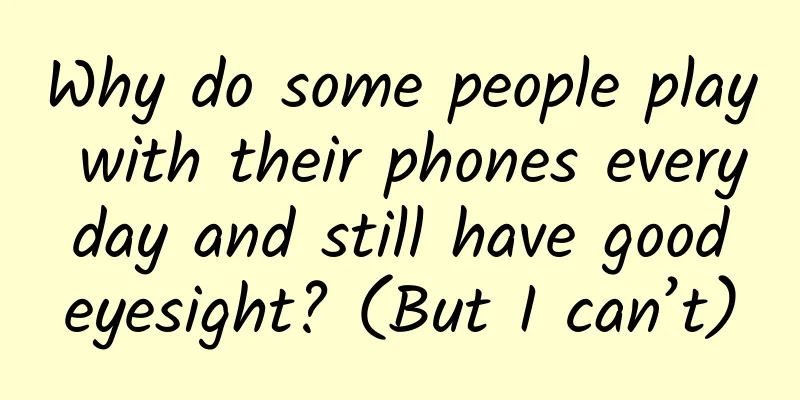Why do some people play with their phones every day and still have good eyesight? (But I can’t)

|
Myopia is a problem. Once you forget to wear glasses, you can't see the screen clearly in meetings, and you can't recognize people on the road, which means both your career and love life are affected. Not to mention the pain of sweaty nose bridge and slippery glasses in summer and foggy lenses in winter. However, while your own misfortune is terrible, the success of others is even more worrying. There may be such a person around you, who looks ordinary. But if this person doesn't play with his mobile phone very often, it's still acceptable. That means his good eyesight is obtained through "the pain of long-term self-discipline" or "ignorance of not understanding how fun mobile phones are". God is fair. However, thinking back carefully - he/she clearly never puts down his/her phone and never takes his/her eyes off the screen... why is there such a difference? When you see these people, you will definitely be envious and wonder: How did they do it? (And a secret request: Is there any secret I can learn?) Copyright images in the gallery. Reprinting and using them may lead to copyright disputes. Reason 1: They may have won the genetic lottery! If there is someone around you who has never been nearsighted, you can ask him or her this question: Are your parents also not nearsighted? The answer is probably yes. Image source: a social platform This is supported by research. A classic study in 2007 showed that whether parents are myopic significantly affects the myopia rate of their children. Specifically, the myopia rates of children in the three situations where both parents are myopic, one parent is myopic, and neither parent is myopic are 43.6%, 14.9%, and 7.6%, respectively. Image source: Literature, Dingxiang Doctor Design Team You may wonder: If it is hereditary, why are my parents myopic, but I remember that my grandparents have good eyesight? It is like this - even if the parents' myopia is acquired, it is possible to pass it on to their children. In addition to genes, differences in other hardware devices also lead to differences in whether people will become nearsighted and when they will become nearsighted in the future. When people are born, their eye axes are relatively short, and most of them are farsighted. This is medically called hyperopia reserve. As they age, the eye axes will grow to normal length, and people will have normal vision. After growing to normal length, if it grows further, they will become nearsighted. Some people have more hyperopia reserve and their eye axes grow slowly, so they are not prone to myopia. These are all innate, don't envy them! Reason 2: There are indeed some acquired factors If it were all innate, it would be too disheartening. It's like if a person who does nothing but lies down all day wins 5 million in the lottery, we would think: How did he win? Why didn't I win? But if a person gets up early and works hard selling starch sausages, saves money for 10 years and saves 5 million, we would think: Great, he deserves this money. So, for those people who play with their mobile phones every day but are not nearsighted, apart from being born with good luck, are there any other reasons that can make us feel more balanced? Yes, it is true. Myopia is related to heredity, but what children inherit is the constitution that makes them prone to myopia, not myopia itself. It can be understood this way: the process of myopia is like adding weights to a scale, and when the weights accumulate to a certain level, myopia will occur. The weights can come from heredity or from the environment, and the more weights are added, the more serious the myopia will be. There are many environmental factors, one of which is particularly critical during childhood: not liking to go out. People who are not nearsighted may have loved outdoor activities when they were young. Studies have shown that the time spent outdoors is negatively correlated with the incidence of myopia. Moreover, the duration of outdoor activities itself is an important factor affecting myopia, regardless of the level of physical activity. In other words, as long as you spend enough time outdoors, you can effectively prevent myopia, regardless of whether you are exercising or not. However, the effect of outdoor activities on the eyes is basically limited to before adulthood. It can be said that if you work too hard when you are young, you will regret it when you are old. Not being nearsighted now does not mean you will never be nearsighted Protecting your eyes is everyone's job Okay, heartbroken myopic people, you’ve heard too much bad news, now let’s listen to some good news: those damn friends who play with their cell phones every day but are not myopic may still become myopic one day in the future! After all, although genes are powerful, they are not omnipotent. No matter how good your innate conditions are, they cannot withstand too much nurture - looking at your phone for too long, looking at your phone in the wrong posture, looking at your phone in the dark...all these will increase the weight from the environment. Image source: Dingxiang Doctor Comments Section Moreover, playing with the phone too much is a bad habit after all. If you are too close to the phone, even if you are not nearsighted, you will have dry eyes, visual fatigue and other problems. (Please forward this to those around you who are not nearsighted, and remind them: if you really play with your phone late at night, your eyes will not let anyone go. Don't relax, you still have to protect your eyes! ) People with myopia should not give up just because they already have myopia. Although myopia is difficult to reduce, it can still get worse. It is indeed difficult for modern people to leave their mobile phones. In addition to the correct but difficult advice of looking at mobile phones less, we have some more practical and easier to do suggestions, please check: 1 Use the correct posture to look at the phone Don't keep your eyes too close to the phone, and keep your lines of sight as parallel as possible. 2 Adjust the phone screen brightness Mismatch between screen brightness and ambient brightness will cause eyes to be in a state of fatigue for a long time, which will not only easily damage eyesight but also induce other eye diseases. Remember a principle: when the environment is bright, the screen is bright; when the environment is dark, the screen is dark. Specific brightness reference: Daytime/bright environment: Morning sunlight brightness, 60% screen brightness Noon sunlight brightness, 100% screen brightness Afternoon sunlight brightness, 80% screen brightness Night/dark environment: 0%~30% screen brightness 3 People with high myopia need to have an eye fundus examination every year 4 Eye protection action ● Every half an hour, look up at a distance of 6 meters for 20 seconds ● Even if you don’t have time to stand up, try to blink as much as possible 5 Some things that hurt your eyes are best not to use or use less for example: Mobile phone privacy film : it will reduce the screen brightness, which will make it harder for the eyes to see things, and it is easy to cause visual fatigue or even vision loss; Expired eye drops : If you continue to use them, it may cause eye redness and stinging at the mildest, or corneal ulcers and decreased vision at the worst. Glasses with damaged film : will affect the accuracy of corrected vision, cause eyestrain, and further damage vision. They might look like this 👆🏻 Image source: 🍠 We can only envy others’ good eyesight; we cannot reverse the lost eyesight; but we can prevent the eyesight from continuing to deteriorate! References [1] Ip, Jenny M., et al. "Ethnic differences in the impact of parental myopia: findings from a population-based study of 12-year-old Australian children." Investigative ophthalmology & visual science 48.6 (2007): 2520-2528. [2] Lingham, G., Mackey, DA, Lucas, R., & Yazar, S. (2019). How does spending time outdoors protect against myopia? A review. British Journal of Ophthalmology, bjophthalmol–2019–314675. doi:10.1136/bjophthalmol-2019-314675 [3] Li Liang, Xu Jianfang, Lu Yingli, et al. Research progress on outdoor activities and physical exercise in preventing and controlling myopia in children and adolescents. Chinese Sports Science and Technology, 2019. [4] Sherwin, Justin C., et al. "The association between time spent outdoors and myopia in children and adolescents: a systematic review and meta-analysis." Ophthalmology 119.10 (2012): 2141-2151. Planning and production Source: DingXiang Doctor (ID: DingXiangYiSheng) Review | Li Xiaoming, deputy chief physician of fundus, Affiliated Hospital of Changchun University of Chinese Medicine Editor: Yinuo Proofread by Xu Lai and Lin Lin The cover image and the images in this article are from the copyright library Reprinting may lead to copyright disputes |
<<: A crab with 17 legs? Uncovering the secrets of the mysterious creature "Myoga"
>>: Butter rice cake is very popular, but not everyone can eat it——
Recommend
iOS 14 exposure: Apple is expected to allow users to change the default browser
For a long time, iOS has been a bit inhumane, in ...
Check out the four growth strategies used by big companies like Tencent and NetEase
Behind the success of large companies, in additio...
Baidu search oCPC account establishment practice
This article is a practical tutorial for setting ...
Wild special effects course: "Photoshop" videos like photoshopping pictures
Wild special effects course: "P" like a...
Why do some people have blue veins on their hands? Be careful if you have blue veins in these places
Have you ever noticed this phenomenon: some peopl...
#千万IP创科普# Can you tell by the legs? The Minnan people teach you how to distinguish the "three cephalopod brothers"
📙Reading tips: The content comes from the diction...
Sparking heated discussion: Can microplastics in takeout really invade the brain within two hours?
Previously, the topic #Microplastics in takeout c...
Are the white spots on glasses not dust but disease? People of this type should pay special attention!
Recently, the issue of white spots appearing on g...
Mars' leopard print may be the most powerful evidence of life
NASA 's Perseverance rover has discovered pos...
How to promote Xiaohongshu, and what to pay attention to when taking notes on Xiaohongshu!
When it comes to Xiaohongshu’s promotion methods,...
Will drinking water while eating cause indigestion? Don’t fall into these water drinking misunderstandings
Drinking water is a very common thing, but some p...
You must have heard these rumors about cucumbers! Have you been deceived again in recent years?
Cucumber is one of the few vegetables that can be...
Does the Earth need to wander? Have you ever seen a space elevator? Here's everything you want to know about "The Wandering Earth 2"
Is the Digital Life Project feasible? What is a r...
The "frozen" flowing water, the floating ice disks... Look, the crystal clear ice and snow wonder!
...
Cloudrive 3.0, an integrated dual-map navigation system, is first installed on Tiggo 5x, opening up a new way of intelligent human-vehicle life
What will the future of car life look like? With ...









